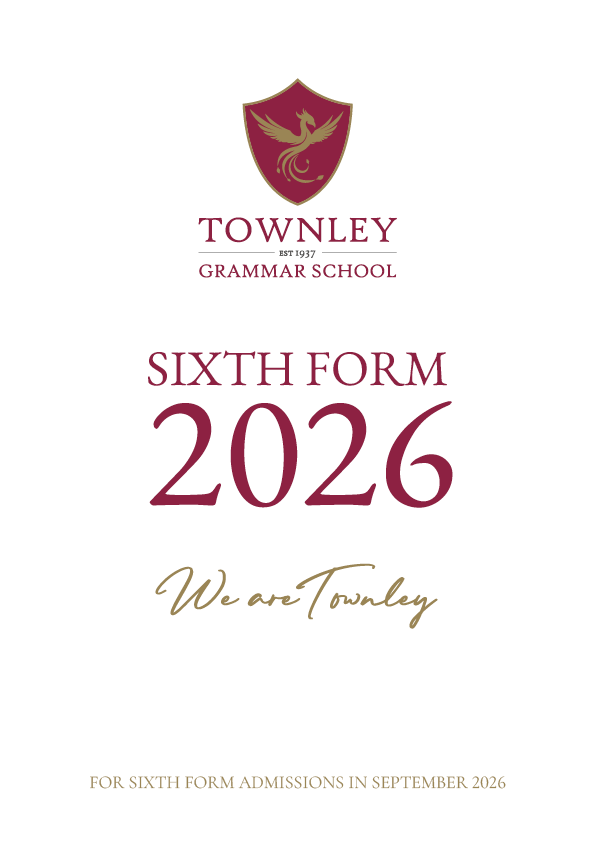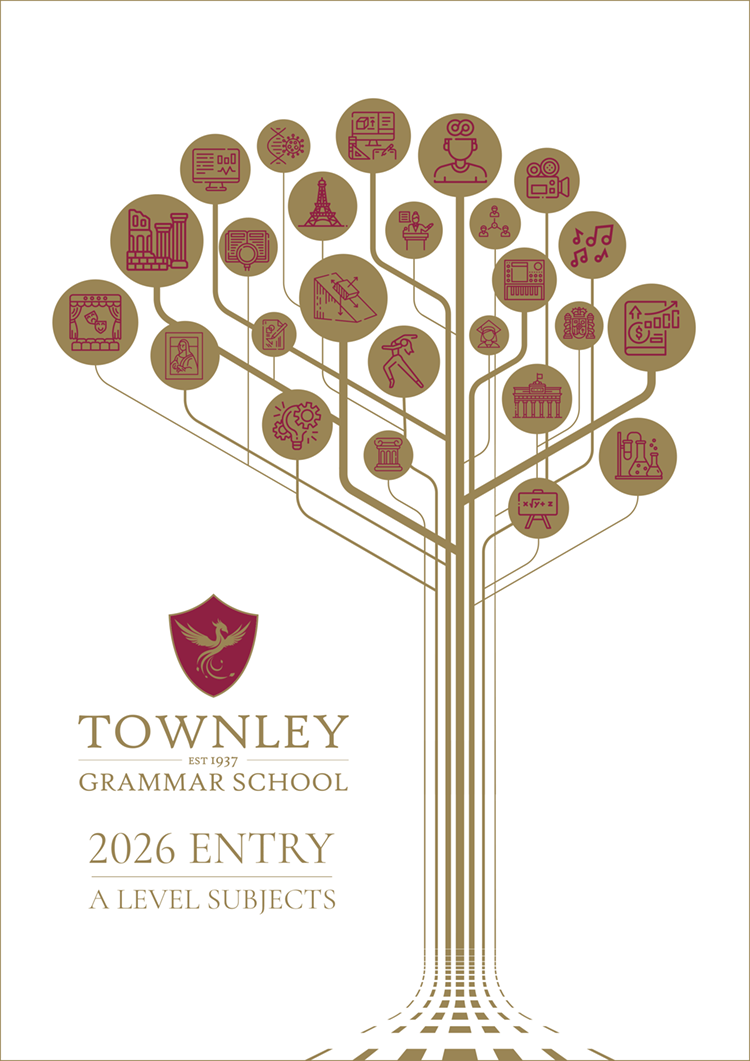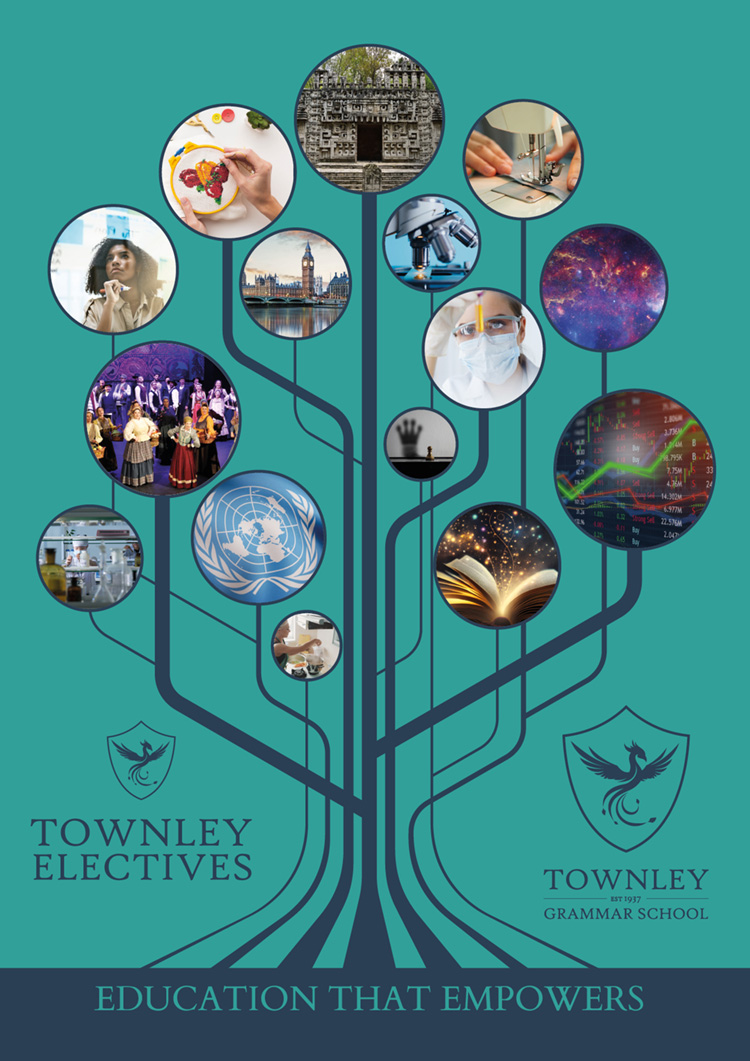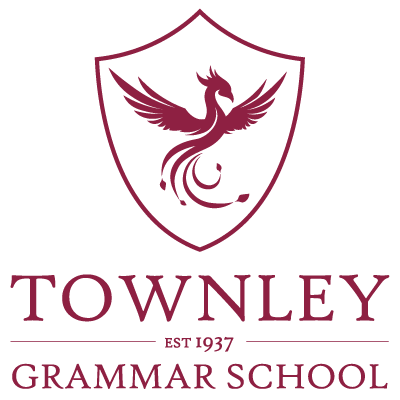Applications for our Sixth Form for entry in September have now closed.
The Deadline for applications was 4.00pm Friday 16th January 2026
Prospectus, A-Level Curriculum & Electives Guides 2026-27
Sixth Form Curriculum
What’s on offer in Townley Sixth Form?
Townley offers students the opportunity to study three or four A Levels with a range of electives to allow for an enhanced but specialised programme of study. There are six different programmes of study for students:
- Programme 1 – 3 A Levels + 2 Electives
- Programme 2 – 3 A Levels + 1 Elective + EPQ
- Programme 3 – 3 A Levels + 3 Electives
- Programme 4 – 4 A Levels + 1 Elective
- Programme 5 – 4 A Levels + 2 Electives
The programme chosen will depend on a future career path as well as whether they want to specialise in a few subjects or a wider variety. Further Mathematics must be chosen as a fourth A Level only.
- A Levels – two-year linear qualification, 6 x 50-minute lessons a week
- EPQ/Extended Project Qualification – accredited qualification – 1 x 50-minute lesson a week
- Elective Course – a range of one year accredited and non-accredited courses enriching your education – 1 x 50-minute lesson a week
Take a look at the Townley Grammar Curriculum Vision
Subject Criteria
Art and Design
Minimum of a 6 in GCSE Art
PDF Overview of the course
Biology
Minimum of a 7 in GCSE Biology (or 7 grade in both GCSE Core & Additional)
PDF Overview of the course
Chemistry
Minimum of a 7 in GCSE Chemistry (or 7 grade in both GCSE Core & Additional)
PDF Overview of the course
Classical Civilisation
Minimum of a 6 in GCSE English Literature
PDF Overview of the course
Computer Science
Minimum of a 6 in GCSE Computing (or 6 in GCSE Mathematics if Computing not taken at GCSE)
PDF Overview of the course
Dance
Minimum of a 6 in GCSE Dance or passed audition (if Dance not taken at GCSE)
PDF Overview of the course
Drama and Theatre
Minimum of 6 in GCSE Drama and 6 in GCSE English, plus audition
PDF Overview of the course
Economics
Minimum of a 6 in GCSE Mathematics
PDF Overview of the course
English Literature
Minimum of a 6 in GCSE English Literature
PDF Overview of the course
EPQ
Extended Project Qualification
PDF Overview of the course
Film Studies
Minimum of a 6 in GCSE English Language
PDF Overview of the course
French
Minimum of a 6 in GCSE French
PDF Overview of the course
Further Mathematics
Minimum of an 8 in GCSE Mathematics
PDF Overview of the course
Geography
Minimum of a 6 in GCSE Geography
PDF Overview of the course
German
Minimum of a 6 in GCSE German
PDF Overview of the course
History
Minimum of a 6 in GCSE History
PDF Overview of the course
Latin
PDF Overview of the course
Mathematics
Minimum of a 7 in GCSE Mathematics
PDF Overview of the course
Music
Minimum of a 6 in GCSE Music plus audition
PDF Overview of the course
Philosophy and Ethics
Minimum of a 6 in GCSE Religious Studies
PDF Overview of the course
Physical Education
Minimum of 6 in GCSE PE
PDF Overview of the course
Physics
Minimum of a 7 in GCSE Physics (or 7 grade in both GCSE Core & Additional)
PDF Overview of the course
Politics
Minimum of a 6 in GCSE Humanities subject
PDF Overview of the course
Product Design
Minimum of a B in GCSE DT Graphics, Resistant Materials or Product Design and portfolio seen
PDF Overview of the course
Psychology
Minimum of 6 in GCSE Biology and in GCSE EnglishPDFSociologyMinimum of a 6 in a GCSE Humanities subject
PDF Overview of the course
Sociology
PDF Overview of the course
Spanish
Minimum of a 6 in GCSE Spanish
PDF Overview of the course
Prospectus, A-Level Curriculum & Electives Guides 2026-27
View our sixth Form 2026-27 Prospectus, A-Level Curriculum 2026-27 & Electives Guide 2026-27
Sixth Form Online Applications
Transition to Sixth Form
Entry Criteria
- The overall requirement for entry to the Sixth Form is an Average Point Score of 6.00 across your best 8 subjects which must include English and mathematics (English & Maths grade 5 or above).
- The overall entry requirements for students applying for two performing arts subjects and one additional A Level subject require an Average Point Score of 5.5 plus a successful audition and a minimum of grade 6 in GCSE English.
- The overall entry requirement for students applying for three performing arts subjects require an Average Point Score of 5.00 plus a successful audition and a minimum of grade 6 in GCSE English.
- In addition, students are required to have at least grade 6 and above in the subjects they intend to study in the Sixth form, except Mathematics which require a minimum of a grade 7 at GCSE (8/9 for Further Maths). Science require grade 7.
Further information on entry criteria and individual subject criteria
Conditional offers are based on predicted grades; actual places are not confirmed until GCSE results are announced. This may mean that some courses become oversubscribed and if there are more applicants than places available then we will allocate places according to the over-subscription criteria below:
- GCSE Point Score
- Over subscription on a course
- Being a Performing Arts School with a second specialism in Mathematics and Computing, greater weighting may be given to these subjects
- Looked after children or other extenuating circumstances which we feel warrant special consideration
- Siblings
- Distance
- Being a girls’ school there is a limitation on the number of boys we can admit taking into consideration the facilities we can provide
Applications from Townley Students
You must have completed the initial electronic subject choices form by 4.00pm Friday 16th January 2026. Please see the front page of the website and follow the link for admissions and internal students.
Applications from Newcomers
You must have submitted your electronic application form with subject choices by 4.00pm, Friday 16th January 2026 - please see the front page of the website and follow the link for admissions and newcomers. Once we have received your application, we will contact your school and request your predicted grades. We may then need to invite you into school for the Assessment/Audition Day (see below).
We are sorry, but in all cases, late applications will not be considered.
Notification of the outcome of your application will be sent out in the week commencing Monday 6th April 2026 if your predicted grades and assessment/audition indicate that you are likely to fulfill our admissions criteria for entry into the Sixth Form. We can only accept the predicted grades received from our initial request to your school; we cannot re-consider your application or option choice if your grades change during the academic year.
Assessment and Audition Days
- Townley students applying for Mathematics or Further Mathematics will be asked to sit a guidance assessment. This will all take place on Monday 19th January 2026, 2.45pm, so please keep this time free.
- Students who are unsuccessful in their assessment/audition will have an opportunity to select an alternative subject.
- Newcomers applying for Mathematics or Further Maths are required to attend our assessment day on Saturday 24th January 2026 so please keep this date free.
- Applicants applying for a subject within the Performing Arts cluster (Dance*, Music and Theatre Studies) are required to audition. Auditions will be held using video footage, please refer to our subject information on our website for full details. *Dance audition required if dance not taken at GCSE.
Appeals
If an application is refused there is a statutory right of appeal to the Independent Schools Appeal Panel.
Admissions Policies
Please view of admisions policies from our Policies and Reports page.






